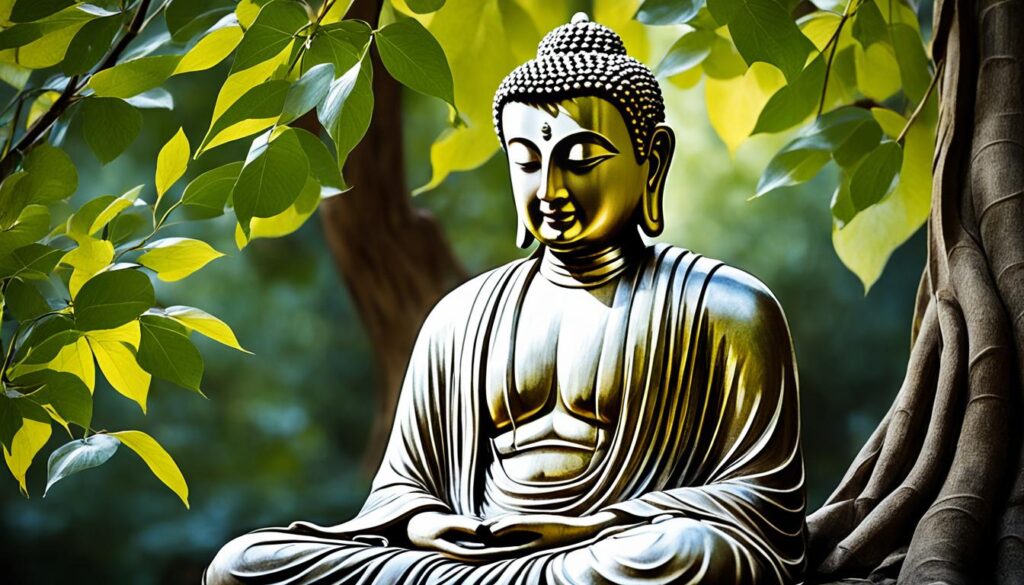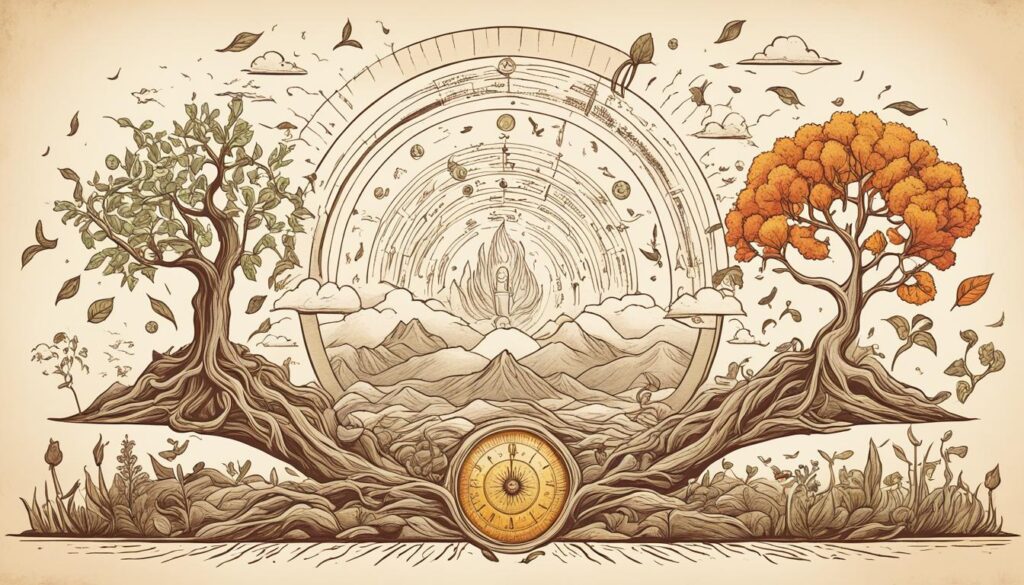In the pursuit of meaning and purpose, humanity has sought wisdom from various sources. Buddhism, with its profound teachings and principles, offers a path towards enlightenment and inner harmony. As the Buddha himself once said, “The mind is everything. What you think, you become.”
Buddhism, originating in South Asia in the 5th century B.C.E., revolves around the recognition of suffering as an intrinsic part of human existence. However, it also holds the promise of liberation through achieving enlightenment, known as nirvana. Rejecting the notion of a supreme deity, Buddhism emphasizes self-discovery, mindfulness, compassion, and wisdom to navigate the complexities of life.
Understanding the basic beliefs of Buddhism grants us insight into the human condition and unveils a transformative journey towards spiritual growth. Let us explore the fundamental tenets of this ancient philosophy, uncovering the key principles that can illuminate our lives and guide us to a deeper understanding of ourselves and the world around us.
Key Takeaways:
- Buddhism acknowledges the human suffering and offers a path towards liberation.
- Enlightenment, or nirvana, is the ultimate goal in Buddhism.
- Mindfulness, compassion, and wisdom are central to the Buddhist path.
- Buddhism emphasizes self-discovery, personal growth, and inner transformation.
- The mind plays a vital role in shaping our reality and determining our well-being.
The Life of Siddhartha Gautama and the Four Noble Truths
Discover the inspiring life story of Siddhartha Gautama, the founder of Buddhism, and the profound teachings encapsulated in the Four Noble Truths.
Siddhartha Gautama, born a prince in present-day Nepal around the fifth century B.C.E., embarked on a transformative spiritual journey in search of the ultimate truth and liberation from suffering. Renouncing his luxurious lifestyle, he immersed himself in profound meditation and self-discovery, undertaking rigorous practices to attain enlightenment.
After years of unwavering dedication, Siddhartha Gautama achieved the state of enlightenment and became known as the Buddha, or the “Awakened One.” Through his remarkable journey, he shared invaluable teachings that hold deep meaning and relevance even in today’s world.
The Four Noble Truths, central to Buddhism, provide illuminating insights into the nature of human existence and present a path to liberation from suffering:
- The Existence of Suffering: Life is inherently characterized by suffering, encompassing physical pain, mental anguish, and the dissatisfaction that arises from the impermanent nature of worldly experiences.
- The Origin of Suffering: The root cause of suffering is desire and attachment, as individuals become entangled in the endless pursuit of pleasure, material possessions, and ego-driven pursuits.
- The Cessation of Suffering: There is a way to overcome suffering by extinguishing desire and achieving a state of complete liberation and inner peace known as Nirvana.
- The Path to the Cessation of Suffering: The Eightfold Path, a comprehensive guide to ethical conduct, mental discipline, and wisdom, offers a transformative roadmap to achieve liberation from suffering and attain Nirvana.
These profound teachings provide individuals with the tools to examine and transcend the nature of suffering, offering solace, clarity, and the potential for genuine transformation.

As depicted in the image above, Siddhartha Gautama’s journey towards enlightenment exemplifies the indomitable spirit of a seeker who defied societal conventions and navigated the depths of consciousness to uncover universal truths.
Karma, Reincarnation, and Nirvana in Buddhism
In Buddhism, the principles of karma, reincarnation, and nirvana play significant roles in understanding the nature of human existence and the path to enlightenment. Let’s explore these foundational concepts and their profound implications.
Karma: The Law of Cause and Effect
Buddhists believe in the concept of karma, which states that every action, whether good or bad, has consequences. Karma can be seen as the law of cause and effect, shaping our present experiences and future lives. Good actions generate positive karma, leading to favorable outcomes and potentially elevating one’s rebirth. Conversely, negative actions produce negative karma, resulting in unfavorable circumstances and the potential for a lower form of rebirth.
Reincarnation: The Cycle of Birth and Death
Buddhism acknowledges the impermanent nature of human existence and embraces the idea of reincarnation. Reincarnation is the continuous cycle of birth and death, where individuals are reborn into new lives based on their karma and actions in previous lives. This cycle continues until one achieves liberation from the cycle, reaching the ultimate goal of enlightenment.
To illustrate the concept of reincarnation, consider the analogy of a flame passing from one candle to another. Each new candle represents a new life, and the flame represents consciousness. The key notion here is that consciousness continues to exist and transfer from one life to another, experiencing different manifestations and circumstances.
Nirvana: The State of Liberation
The ultimate goal in Buddhism is to attain nirvana, which signifies the end of suffering and the cessation of the cycle of rebirth. Nirvana is a state of ultimate liberation, peace, and enlightenment, where one transcends the limitations and attachments of the physical world. It is a state of pure bliss and understanding, free from the constraints of desire and ego.
Imagine the experience of nirvana as the complete extinguishment of the flame from the analogy above. The flame, representing the cycle of birth and death, ceases to exist, leaving behind only stillness and tranquility.

| Concept | Definition |
|---|---|
| Karma | The law of cause and effect. Actions have consequences, shaping present and future experiences. |
| Reincarnation | The cycle of birth and death. Consciousness continues across multiple lives, driven by karma. |
| Nirvana | The state of liberation and enlightenment. The ultimate goal of Buddhism, marking the end of suffering and rebirth. |
The Eightfold Path and the Role of Bodhisattvas
As a Buddhist, your journey towards enlightenment is guided by the Eightfold Path and the inspiring role of Bodhisattvas. The Eightfold Path is a set of guidelines that outline the path to achieving nirvana, the ultimate goal of Buddhism. It encompasses three categories: moral conduct, concentration, and wisdom.
“Following the Eightfold Path not only leads to personal enlightenment but also contributes to a more compassionate and harmonious society.”
Moral Conduct
The first category of the Eightfold Path is moral conduct, which emphasizes the importance of virtuous actions. This involves cultivating right speech, right action, and right livelihood. Right speech encourages the practice of truthful and compassionate communication, avoiding harmful speech such as lying or gossip. Right action entails adhering to ethical behavior, refraining from harming others and engaging in acts of kindness and generosity. Right livelihood relates to choosing a profession that aligns with moral principles, ensuring your work promotes goodwill and does not cause harm.
Concentration
The second category of the Eightfold Path is concentration, which focuses on developing mindfulness and concentration through mental discipline. Right effort involves cultivating positive states of mind and eliminating negative ones. Right mindfulness encourages present moment awareness, observing thoughts and sensations without judgment. Right concentration involves attaining single-pointed focus through meditation, enhancing clarity and tranquility of the mind.
Wisdom
The third category of the Eightfold Path is wisdom, which encompasses developing a deeper understanding of reality and cultivating wise thoughts. Right thought involves abandoning harmful and negative thoughts while cultivating thoughts of kindness, compassion, and non-attachment. Right understanding involves gaining insight into the true nature of existence, recognizing the impermanence and interconnectedness of all phenomena.
Additionally, some branches of Buddhism place great importance on the role of Bodhisattvas. A Bodhisattva is a being who has made a compassionate vow to attain enlightenment for the benefit of all sentient beings. They walk the path of enlightenment selflessly, dedicating their lives to helping others on their spiritual journeys. Bodhisattvas inspire and guide practitioners, embodying the ideal of unconditional love, compassion, and wisdom.

| Categories | Aspects of the Eightfold Path |
|---|---|
| Moral Conduct |
|
| Concentration |
|
| Wisdom |
|
Conclusion
Buddhism offers profound teachings that guide individuals on the path to enlightenment, providing valuable insights for navigating the challenges of modern life and fostering personal and societal harmony. By delving into the basic beliefs of Buddhism and incorporating its principles into their lives, individuals have the opportunity to embark on a transformative spiritual journey.
Central to Buddhism teachings is the pursuit of mindfulness, compassion, and wisdom. Mindfulness allows individuals to cultivate a deeper awareness of the present moment, fostering a sense of inner peace and clarity. Compassion encourages the cultivation of empathy and kindness towards all beings, promoting unity and understanding. Wisdom involves developing a deeper understanding of the nature of reality, questioning conventional views, and seeking truth.
Through the teachings of Buddhism, individuals can find solace in the face of suffering and seek to alleviate it in the world around them. By practicing mindfulness, embracing compassion, and striving for wisdom, one can contribute to a more harmonious and compassionate society. The path to enlightenment is a lifelong journey of self-discovery and growth, offering the potential for profound personal transformation.
FAQ
What are the basic beliefs of Buddhism?
The basic beliefs of Buddhism include the recognition of suffering as a fundamental part of human existence, the pursuit of enlightenment or nirvana to escape the cycle of suffering and rebirth, and the absence of belief in a deity or god.
Who is Siddhartha Gautama and what are the Four Noble Truths?
Siddhartha Gautama, also known as the Buddha, was the founder of Buddhism. The Four Noble Truths are central teachings in Buddhism that address the existence of suffering, the origin of suffering, the cessation of suffering, and the path to the cessation of suffering.
What is karma, reincarnation, and nirvana in Buddhism?
Karma is the belief that one’s actions have consequences in this life and future lives. Reincarnation is the cycle of rebirth, reflecting the impermanent nature of human existence. Nirvana is the ultimate goal in Buddhism, signifying the end of suffering and the cycle of rebirth.
What is the Eightfold Path and what is the role of bodhisattvas?
The Eightfold Path is a set of guidelines in Buddhism that practitioners follow to achieve nirvana. It consists of categories such as moral conduct, concentration, and wisdom. Bodhisattvas are beings who vow to help others achieve enlightenment and are seen as important figures in some branches of Buddhism.
How can understanding the basic beliefs of Buddhism benefit individuals and society?
Understanding and practicing the basic beliefs of Buddhism can help individuals embark on a spiritual journey towards enlightenment and find ways to alleviate suffering in the world. Buddhism’s emphasis on mindfulness, compassion, and the pursuit of wisdom offers profound teachings for personal and societal harmony.

